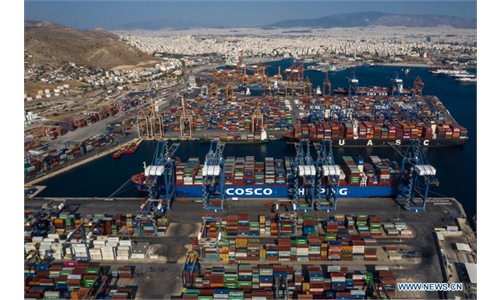
Illustration: Liu Xiangya/Global Times
It is not surprising that some Western observers and media outlets are once again resorting to promoting the "China threat" theory in order to exert pressure on Chinese manufacturing industries. This time, their target is China's shipbuilding sector. Vigilantly, these false accusations have the potential to disrupt the global supply chain and further harm the world's already fragile economy.A recent example of this is an article from the Wall Street Journal (WSJ) entitled "China's Shipyards Are Ready for a Protracted War. America's Aren't." The article deliberately confuses the civilian shipbuilding industry and normal commercial operations with a country's naval strength, aiming to mislead public opinion and perpetuate the "China threat" theory.
The "China threat" lie is an old trick that the US-led camp has used to defame and smear China. Attention-grabbing though it is, this kind of distorted narrative cannot provide an accurate portrayal of China's shipbuilding sector and the restructuring of global industrial chains.
It should be noted that the development of China's shipbuilding sector is a natural result of the growth of China's manufacturing strength and the increased demand for maritime transport. This has nothing to do with a "protracted war" or any so-called "military threat." As the largest trading country in the world, China is the most important trading partner for many countries and regions. Given the large trade volume, demand for maritime transport is huge, providing fertile soil for shipyards to grow and develop.
As reported, China's shipbuilding businesses posted significant increases in 2023, demonstrating improved global competitiveness. According to the Xinhua News Agency, major shipbuilders' profits surged 131.7 percent year-on-year, and their main business revenue stood at 623.7 billion yuan ($86.7 billion), up 20 percent. These results show that market forces vote with their feet.
Maritime transport is the backbone of international trade and the global economy. Statistics show that more than 80 percent of the volume of international trade in goods is carried by sea, and the percentage is even higher for most developing countries. The development of China's shipbuilding industry will help increase the capacity of the global merchant fleet, stabilize sea freight rates and ensure the stability of the global supply chain.
By sparing no effort to hype the "China threat" theory, some Westerners try to contain China's economic rise and smear China's shipbuilding business. However, baseless fears about commercial vessels will have a negative impact on the entire global supply chain.
China is the world's largest shipbuilding country, but some Western media outlets deliberately ignore the fact that Chinese shipyards import a large number of components and intermediate products from European and American companies. The shipbuilding industry is known as the crown jewel of integrated industries, because it involves a large number of components, a long supply chain and a strong correlation among various industries. It requires a complex cross-border industrial chain, involving more than 50 sectors such as steel, non-ferrous metals, machinery, and electronics. Suppression of Chinese shipyards will have no results except a lose-lose situation and damage to the global supply chain.
China is a victim since protectionist US policies always target Chinese companies. However, the US has been unsuccessful in inhibiting China's economic growth. After China became the largest shipbuilder in the world, the US-launched smear campaign against China's shipbuilding sector has become more and more hysterical.
People need to be mentally prepared to accept that international trade and cooperation cannot be guaranteed to operate smoothly. Chinese companies may be negatively affected, but we believe that they can overcome difficulties that trade protectionism has triggered through various means, including technological innovation.
The author is a reporter with the Global Times. bizopinion@globaltimes.com.cn



